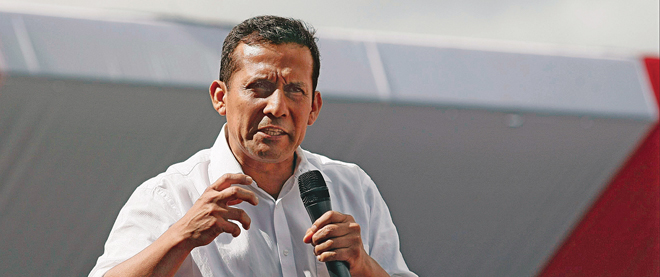A radical transformation for the president of Peru
Ollanta Humala once vowed to nationalize energy and mining. These days, he’s closer to Obama than Chavez.
Share

His name means “the warrior who sees it all” in Quechua, the native South American language of the Incans. Ollanta Humala, Peru’s president since 2011, is indeed a fighter, a former army officer who crushed the Shining Path, a Maoist insurgent group, in the 1990s and later helped lead an army revolt against the corrupt presidency of Alberto Fujimori.
His new battle is more subtle: he must steer one of Latin America’s fastest-growing economies and prove that his transition from radical nationalist to moderate politician is genuine.
Humala, 49, grabbed the spotlight in 2006 when he won a surprise slot in the second round of the presidential election as leader of Peru’s Nationalist Party. The conservative Alan García beat him, but Humala used the loss as a chance to reinvent himself. He replaced the more incendiary rhetoric against free trade and U.S. relations with a moderate discourse, embraced Western economic orthodoxy and distanced himself from former ally Hugo Chávez. Brazilian consultants and Humala’s wife, Nadine Heredia, a communications expert and his closest political aide, helped with the transformation.
Humala was elected president with 51 per cent of the vote last June, heading a coalition of left-leaning parties named “Peru Wins.” But the win wasn’t exactly an endorsement of Humala. His main opponent was Keiko Fujimori, daughter of the former president—now in jail for misuse of public funds, kidnapping and murder. As she climbed in the polls with little more to offer than a pardon for her father, terrified voters turned to Humala, the wild card. To Peru’s Nobel laureate Mario Vargas Llosa, the choice facing voters was like one “between AIDS and cancer.”
So far, Humala has kept his word. He has surrounded himself with technocrats from previous governments and maintained an amicable tone toward Washington. But to some he remains a mystery. He continues to call himself a nationalist rather than a leftist, but how much is window dressing is uncertain.
His outspoken family is a constant distraction. His father, Isaac, is an Incan supremacist who preaches the superiority of “copper-skinned” natives; his brother Antauro was jailed for leading an anti-government revolt; his mother, Elena Tasso, an activist, accuses him of betraying the family’s ideals.
And yet Humala’s popularity remains steady above 50 per cent, and even some in the media have begun to back off. “His transformation is genuine,” says Augusto Álvarez Rodrich, a Peruvian journalist and political analyst. “The media made a caricature of him, but he’s not nearly as radical as he’s depicted.” Others, however, think he’s gone too far. Native groups in regions touted for mining projects decry Humala’s change in favour of resource extraction. During his campaign, he had promised to stop some projects, asking locals to “choose between water or gold.”
Now, in a semantic about-face, Humala says he wants communities to have “water and gold.” He has little choice: Peru’s six per cent growth owes much to mining. The Humala mystery may be little more than pragmatism.